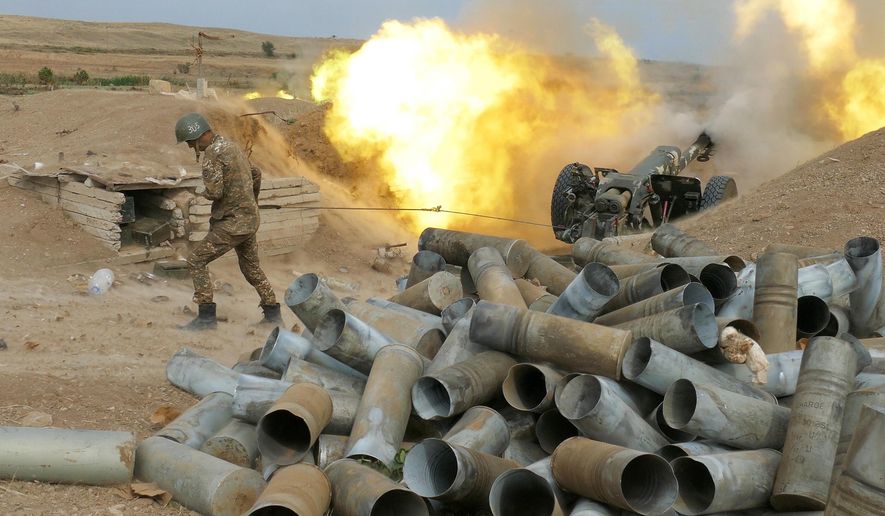OPINION:
The late American statesman Zbigniew Brzezinski once described America’s ally Azerbaijan as the cork in the bottle of the massive energy resources of the Caspian Sea region. Brzezinski’s apt description of one of America’s strongest and most reliable partners on the global stage is precisely why Russia in general and President Vladimir Putin in particular have played a less than constructive role in the resolution of the conflict between Azerbaijan and Armenia over the territory of Nagorno-Karabagh.
Russian objectives as it concerns the conflict between Azerbaijan and Armenia are clear. Moscow prefers control as opposed to stability along its southern periphery. Mr. Putin, like Stalin before him, is a firm believer in the concept of divide and rule. By extension, Moscow does not want to see an enduring peace between Armenia and Azerbaijan because peace means that the entire Caucasus region would be free and independent of Moscow, once and for all. And while Azerbaijan has achieved its independence from Moscow, Russia continues to treat Armenia as its own aircraft carrier in the Caucasus so as to keep the region unstable.
Second, Russia does not share Azerbaijan and the United States’ geopolitical goal of uninterrupted transportation of oil and gas resources from the energy-rich Caspian Sea to Europe. Why? Because every cubic meter of natural gas that replaces Russian gas sold into Europe is one less dollar Mr. Putin has to conduct his nefarious activities and support his dictator friends ruling in Iran, Venezuela and Syria. Russia earns around $111.3 billion each year from gas sales to Europe. In fact, Russia may very well have given its ally Armenia the green light this past July to launch an attack in the Tovuz region of Azerbaijan – the pipeline corridor that delivers oil and gas to Europe.
Third, while Russia has forcefully pushed for and demanded respect for U.N. resolutions when it comes to its allies such as the murderous Iranian regime, it has never pushed hard for the implementation of the four U.N. Security Council resolutions in support of the territorial integrity of Azerbaijan and withdrawal of Armenian troops from occupied Azeri territories. Instead, and until now, it has unequivocally supported Armenia, especially by providing military support to Yerevan.
While Russia’s ambitions and motivations along its southern periphery are clear, less understood but equally menacing have been the dangerous objectives of the Iranian regime — Iran shares a border with both Armenia and Azerbaijan. The launching pad for the Iranian regime’s Nagorno-Karabagh policy starts with Tehran’s deep and strategic ties with Armenia. Yet, the Tehran-Yerevan axis has more to do with what Azerbaijan represents.
First, the Iranian regime does not want a prosperous and independent Azerbaijan on its northern border. Why? Because the Azerbaijan model for economic growth and prosperity is based on normal and constructive ties with the U.S. Not surprisingly, under the leadership of President Aliyev, poverty rates in Azerbaijan have dropped to 5% while the dictatorship of Ali Khamenei has forced 60 million Iranians below the poverty line.
Second, the thugs ruling Iran despise Azerbaijan’s culture of religious tolerance. While Christians, Jews and Bahais can practice their faith freely in Azerbaijan, under the dictatorship of the ayatollahs, religious minorities (especially the Bahai community) are harassed, and in some cases murdered.
Closely related to the multi-cultural fabric of Azerbaijan is this Muslim nation’s strong relations with Israel. In fact, one of the largest synagogue’s outside of Israel is located in Baku. Not surprisingly, Israel has shown its strong support of Azerbaijan’s counter-offensive to liberate its occupied territories by providing advanced military technology to Azerbaijan.
The Iranian regime’s fealty to Moscow is yet another reason why Tehran tilts towards Armenia. For example, in reaction to footage on social media showing Iranian trucks transporting Russian military cargo to Armenia across the Norduz border crossing, Iranians in Tabriz demonstrated to protest the Iranian regime’s support for Armenia. Not surprisingly, thugs under the control of Ali Khamenei brutally put down the demonstrators.
In short, neither Moscow nor Tehran can be trusted to deliver lasting peace between Azerbaijan and Armenia. And while some have criticized Turkey’s recent foray into the conflict by siding with Azerbaijan, this bold move by President Recep Tayyip Erdogan is simply an outgrowth of frustrations by Ankara over the failure of Russian “diplomacy” during the past 28 years to deliver lasting peace for the peoples of Azerbaijan and Armenia.
Any enduring peace agreement between Azerbaijan and Armenia must address the territorial integrity of Azerbaijan as well as the deep-seated and legitimate security concerns of Armenia, especially in view of the historic tragedies inflicted upon the Armenian people during the Ottoman Empire. The recent Abraham Accords is proof that when the U.S. puts its diplomatic muscle behind a peace initiative, former enemy combatants can become friends.
The current conflict between Azerbaijan and Armenia provides a historic moment for American diplomacy to shine once again. Washington must seize this chance to deliver peace for the people of Azerbaijan and Armenia, thus demonstrating once again to the world that the United States, not Russia, is the best guarantor of global stability and peace.
• S. Rob Sobhani is CEO of Caspian Group Holdings.




Please read our comment policy before commenting.